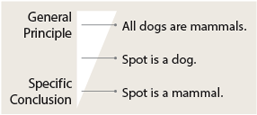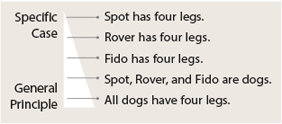Web Page: Deductive Reasoning vs. Inductive Reasoning
Web Page: Deductive and Inductive Arguments
Web Page: Syllogism Definition
Web Page: Examples of Inductive Reasoning
Arguments come in two basic varieties: deductive and inductive. A deductive argument moves from a general statement to a specific case, while an inductive argument moves from specific cases to a general statement.
A deductive argument guarantees its conclusion by starting with a general principle and ending with a specific case. If the general principle is true and the logic of the argument does not have flaws, the conclusion must be true.
 The strength of deductive arguments is that they guarantee their conclusions. The weakness is that they apply known principles to specific conclusions but do not discover new principles. A brief deductive argument, reduced to its basics such as this one, is called a syllogism.
The strength of deductive arguments is that they guarantee their conclusions. The weakness is that they apply known principles to specific conclusions but do not discover new principles. A brief deductive argument, reduced to its basics such as this one, is called a syllogism.
Your Turn Construct a deductive argument by starting with a general principle or statement. Add an observation that relates to it. Then reach a specific conclusion. Is the conclusion true?
An inductive argument does not guarantee its conclusion because it starts with specific cases and arrives at a general principle. It creates a hypothesis that may be supported by the specific facts, but may also prove to be false.
 Though it is true that Spot, Rover, and Fido have four legs and that all of them are dogs, it is not true that all dogs have four legs. (Some have three or fewer.) So the general principle is a hypothesis based on evidence, but one that must be proved or disproved through testing.
Though it is true that Spot, Rover, and Fido have four legs and that all of them are dogs, it is not true that all dogs have four legs. (Some have three or fewer.) So the general principle is a hypothesis based on evidence, but one that must be proved or disproved through testing.
Your Turn Use the following pattern to construct an inductive argument. Is the conclusion true?

Web Page: Deductive Reasoning vs. Inductive Reasoning
Web Page: Deductive and Inductive Arguments
Web Page: Syllogism Definition
Web Page: Examples of Inductive Reasoning
© 2014 Thoughtful Learning
